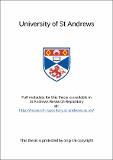Monatism : its ancient sources and modern interpretations
Abstract
As in the Early Church the Montanist movement led to heated debate, so in the last two centuries it has lent itself to diverse interpretations. Of the latter, those which ascribe it in part to geographical, climatic or sociological factors, those which attribute it to pagan religious influence, or to heterodox Judaism, and those which see it as genuinely Christian - a stage in the development of Ebionism, or a reaction to Gnosticism, or an authentic renewal movement - are examined in turn, in the light of the ancient sources. Many of the arguments are shown to be fallacious. In reality it seems most probable that, though Montanism was nurtured within the Church in Asia Minor and shared much of its doctrine and practice, Montanus himself was not a genuine Christian prophet, but rather his ecstatic prophecy and certain other traits of the movement derived ultimately from the syncretistic cult of Apollo in Asia Minor. Tertullian himself, not having witnessed the actual activities of Montanus and his prophetesses, joined the movement because there he thought he found an echo of his own strongly ascetic stance, his doctrinal orthodoxy, and his emphasis on the importance of the Holy Spirit in the life of the Church.
Type
Thesis, BPhil Bachelor of Philosophy
Collections
Items in the St Andrews Research Repository are protected by copyright, with all rights reserved, unless otherwise indicated.

